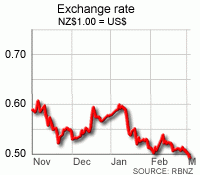
Up until two or three weeks ago the negatives for the New Zealand dollar (NZ$) were confined to lower interest rates and a local economy in recession. The NZ$ had depreciated significantly on the cross-rates against the strong AU$ and EUR, but was holding its own against the US$ and GBP.
 Up until two or three weeks ago the negatives for the New Zealand dollar (NZ$) were confined to lower interest rates and a local economy in recession. The NZ$ had depreciated significantly on the cross-rates against the strong AU$ and EUR, but was holding its own against the US$ and GBP.
Up until two or three weeks ago the negatives for the New Zealand dollar (NZ$) were confined to lower interest rates and a local economy in recession. The NZ$ had depreciated significantly on the cross-rates against the strong AU$ and EUR, but was holding its own against the US$ and GBP.
Today we have many more negatives stacking up against the kiwi and this is why it has nose-dived to below 0.7000. The reversal in global commodity prices has sent the AU$ plunging against the US$ as hedge funds and currency speculators who bought into the AU$/high commodity price duel trade reverse all engines and dump out of the Aussie currency. For the first time in three years the US$ itself is making gains as FX markets quickly realise that the next move in interest rates in Europe and Australia is down, not upwards.
The US$ has broken above a seven-year downtrend line. Adding to the NZ$ selling pressure has been the reiteration last week by Governor Bollard that interest rates are poised to be cut significantly and employment/wages data was as the RBNZ expected and does not alter their monetary policy path. “How low can the kiwi go� - is a question I get asked about 10 times per day. Well – in my view it has much further to go against the US$, perhaps to the low 0.6000’s much quicker than what most would imagine. However on several of the other cross-rates, the weaker AU$ and EUR (stronger US$) should result in stability at these lower cross-rate levels. I see the US$ continuing to strengthen against the EUR, GBP and AU$ as the interest rate differentials to those currencies move in the US$’s favour.
The US$ has completed a major turning point, reflecting that the US economy will be growing again much earlier than Europe and elsewhere. Local exporters in US$’s finally have things going their way with a stronger US$ globally and lower interest rates locally. The further falls in the NZ$/US$ exchange rate over the next several months will be a vital ingredient in stimulating and export-led recovery in the NZ economy by mid 2009. *Roger J Kerr runs Asia Pacific Risk Management. He specialises in fixed interest securities and is a commentator on economics and markets. More commentary and useful information on fixed interest investing can be found at rogeradvice.com.

We welcome your comments below. If you are not already registered, please register to comment
Remember we welcome robust, respectful and insightful debate. We don't welcome abusive or defamatory comments and will de-register those repeatedly making such comments. Our current comment policy is here.